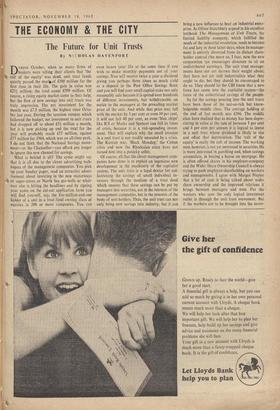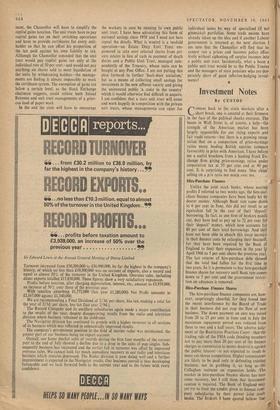THE ECONOMY & THE CITY
The Future for Unit Trusts
By NICHOLAS DAVENPORT uaiNo October, when so many firms of I./brokers were telling their clients that 'the cult of the equity' was dead, unit trust funds quietly passed the marl. of £500 million for the first time in their life. The gain in value was £25f million; the total count £509 million. Of course, a rising equity market came to their help, but the flow of new savings into unit trusts was truly impressive. The net investment for. the month was £7.3 million, the highest since Octo- ber last year. During the taxation rumpus which followed the budget, net investment in unit trusts had dropped off to about £3.1 million a month, but it is now picking up and the total for the year will probably reach £57 million, against £77 million for 1964, which was an all-time peak. I do not think that the National Savings move- ment—or the Chancellor—can afford any longer to ignore this new channel for savings.
What is behind it all? The cynic might say that it is all due to the clever advertising tech- niques of the management companies. You pick up your Sunday paper, read an attractive adver- tisement about investing in the new motorways or super-stores or North Sea gas-wells or what- ever else is hitting the headlines and by signing your name on the Cut-out application form you will find yourself, say, the five-million-and-one holder of a unit in a trust fund owning slices of equities in 200 or more companies. You can even insure your life at the same time if •you wish to make monthly payments out of your savings. You will receive twice a year a dividend giving you perhaps three times as much yield as a deposit in the Post Office Savings Bank and you will find your small capital stake not only reasonably safe because it is spread Over hundreds of different investments, but withdrawable on notice to the managers at the prevailing market price of the unit. And while that price may fall with the market by 5 per cent or even 10 per cent, it will not fall 40 per cent, as even 'blue chips' like ICI or Marks and Spencer can fall in times of crisis, because it is a risk-spreading invest- ment. That will explain why the small investor in a unit trust is not readily unseated by a crisis. The Korean war, 'Black Monday,' the Cuban crisis and now the Rhodesian crisis have not turned him into a panicky seller.
Of course, all that the clever management com- panies have done is to exploit an ingenious new development in the machinery of the capitalist system. The unit trust is a legal device for col- lectivising the savings of small individual in- vestors through the medium of a trust deed which ensures that these savings can be put by managers into securities, not in the interests of the management companies, but in the interests of the body of unit-holders. Thus, the unit trust can not only bring new savings into industry, but it can bring a new influence to bear on industrial enter- prise. As Oliver Stutchbury argued in his excellent textbook The Management of • Unit Trusts, the limited liability company, which fulfilled the needs of the industrial revolution, tends to become fat and lazy in these latter days, when its manage- ment is entirely divorced from its distant share- holder control (the more so, I fear, now the new corporation tax encourages directors to sit on undistributed earnings). The unit trust manage- ments have not yet thrown their weight about; they have not yet told industrialists what they ought to do; but they should be encouraged to do so. They should let the CBI know that a new force has come into the capitalist system—the force of the collectivised savings of the people.
So far the savings pouring into the unit trusts have been those of the not-so-rich but know- ledgeable middle class. The average holding at the end of last month was £366. The middle class have realised that as money has been depre- ciating in value at the rate of between 3 per cent and 4 per cent per annum it is logical to invest in a unit trust whose dividend is likely to rise and offset that depreciation. The 'cult of the equity' is really the cult of income. The working man, however, is not yet interested in securities. He is more interested in gambling and, when savings accumulate, in buying a house on mortgage. He is often offered shares in his employer-company and the Wider Share Ownership Council is always trying to push employee-shareholding on workers and managements. I agree with Margot Naylor that a lot of cant is being talked about wider share ownership and the improved relations it brings between managers and men. For the workers who save the only logical investment outlet is through the unit trust movement. But if the workers are to be brought into the move- meat, the Chancellor will have to simplify the capital gains taxation. The unit trusts have to pay capital gains tax on their switching operations and have to provide certificates for every unit- holder so that he can offset his proportion of the tax paid against his own liability to tax. Although the Chancellor conceded that the unit trust would pay capital gains tax only at the individual rate of 30 per cent—and would not pay anything on shares sold to meet liquidation of the units by withdrawing holders—the manage- ments are finding it almost impossible to work die certificate system. The exemption of gains tax below a certain level, as the Stock Exchange chairman suggests, could relieve both Inland ReVenue and unit trust managements of a griev- ous load of paper work In the end the state will have to encourage the workers to save by running its own public unit trust. I have been achrocating this form of national savings since 1958 and I need not here repeat the details. What is wanted is a twofold operation—an Estate Duty Unit Trust em- powered to take over selected shares from pri- vate estates in lieu of cash in payment of death duties and a Public Unit Trust, managed inde- pendently of the Treasury, whose units can be bought at any•Post Office. I am not putting this plan forward to further 'back-door socialism,' but as a means of collecting small savings for investment in the new affluent society and giving the uninvested public 'a stake in the country' which it would otherwise find difficult to acquire. I am confident that a state unit trust will come and work happily in competition with the private unit trusts, whose managements can cater. for
individual tastes by way of specialised (if not gimmicky) portfolios. Some trade unions have already taken up the idea and if another Labour government is returned at, the next election I am sure that the Chancellor will find that he cannot run a prices and incomes policy effec- tively without siphoning off surplus incomes into a public unit trust. Incidentally, what a boon a public unit trust would be to the Public Trustee and the managers of state pensions who are des- perately short of good inflation-hedging inveSt-



































 Previous page
Previous page